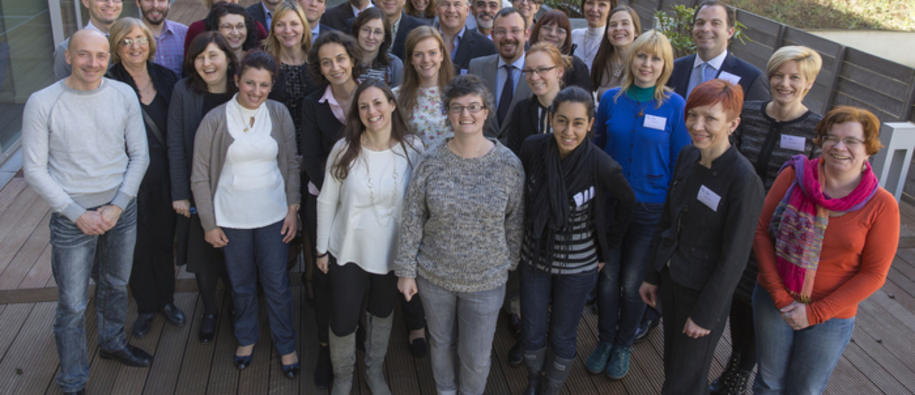Dynamic civil societies are a cornerstone of healthy, stable democracies. Non-governmental organisations (NGOs) play a key role in mobilising citizens, promoting democratic values and tackling key concerns in society.
During a two day workshop in Brussels, NGO programme operators from 15 countries met to share knowledge and expertise.
“We are planting the seeds of positive change that we hope to see in the coming two to three years. In Romania, we have received applications from more than 1 500 projects. We have a wide range of issues that will be tackled by projects covering democracy, human rights, protection of the environment, good governance, social inclusion and empowerment of vulnerable groups”, said Simona Constantinescu from the Civil Society Development Foundation in Romania.
High demand for funding
With over €158 million available in the period 2009-2014 for civil society, support to NGOs is one of the key priorities of the EEA and Norway Grants, with 16 NGO Programmes established across 15 beneficiary countries. The EEA Grants NGO programmes are one of the largest funding schemes for civil society in Central Europe.
The distribution of funding is done through locally established and experienced entities (Operators), who are, in most cases, independent of government. Operators use flexible, open and transparent processes to ensure that grants are distributed in a fair way.
Almost 8 000 applications have been received so far. So far close to € 30M has been distributed to support selected projects.
Knowledge sharing
The workshop was an opportunity to discuss emerging challenges, to improve ways of communication, learn from previous experience and coordinate future events.
“For us, this is the best time to be here. During times of crisis there is a lot of demand. Unfortunately we cannot satisfy everyone, so it is very important that we have high energy and high hopes to use the funds available as efficiently as possible”, said Epaminondas Farmakis, the Programme Director of the Greek NGO programme “We are all Citizens”.
The Norwegian Ministry of Foreign Affairs was also present at the meeting to learn from the experiences of the Operators in the beneficiary countries.
Challenges and opportunities
Over recent years many of the NGOs explained that the economic crisis and political developments have resulted in a weakening of the NGO sector. Some operators reported that governments are increasingly using legislation to constrain civil society organisations.
The EEA Grants aims at strengthening civil society organisations’ capacity, advocacy and watchdog role. The grants help NGOs overcome financial uncertainties and enhance their abilities to respond to political and social challenges.
During the workshop in Brussels, speakers from the European Commission and the European Center for Not-for-Profit Law provided advice on how to deal with challenges that NGOs are facing in Europe today.
“Today, a lot of legal and policy initiatives are threatening the independence of NGOs. This issue is very important because it is the base for what civil societies needs in order to make improvements and change”, said Katerina Hadzi-Miceva Evans, Executive director of the European Center for Not-for-Profit Law, adding:
“There are opportunities out there and the sector is very vibrant; it has a wide breadth of experience to rely on. We can look at tactics that worked in the past, as well as different mechanisms and methods to overcome these challenges and ensure that NGOs can have an impact in their community and can gain support through funding and engagement of citizens”, said Hadzi-Miceva Evans.
Flexible source of support
Funding available from the European Commission is often linked with the very complex eligibility and administrative procedures, in general this is difficult for most NGOs to access. The EEA Grants are therefore seen as a key and flexible source of support in the region, providing capacity building to the sector.
“The NGO Programmes provide tailor-made funding to organisations to address some of the key challenges in society today. The Programmes seek to be administratively flexible and proportionate to the sums involved. In this sense the funding is rather unique in the region. Moreover, it focuses on supporting some activities that are underfunded yet essential such as advocacy, monitoring and defending human rights and democratic processes, areas that are at the heart of our common European values”, said Patrizia Brandellero, senior sector officer for civil society at the EEA and Norway Grants.
Achievements
The NGO programmes have tackled key societal challenges, particularly related to the current social context of rising intolerance and discrimination. Empowering young leaders, fighting poverty through much needed service provision, raising awareness of LGBT rights, and addressing hate speech including online through training of young bloggers are just some examples.
We have also become a strategic partner to the Council of Europe, working together on the Europe-wide NO HATE SPEECH campaign devised by young people to raise awareness of the issue of online hate speech.
Over 500 projects have been funded under the NGO programmes so far. Projects often address unmet needs of communities and promote innovative approaches which in some cases are subsequently taken up by government.
